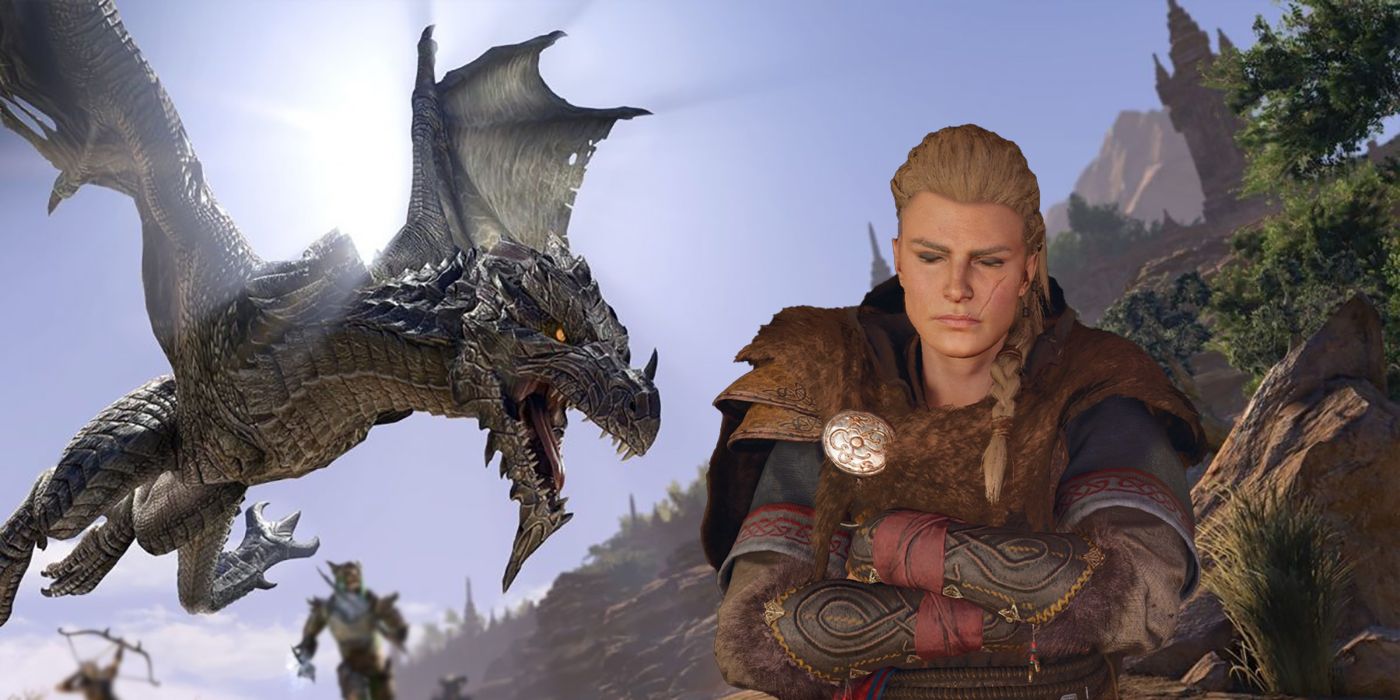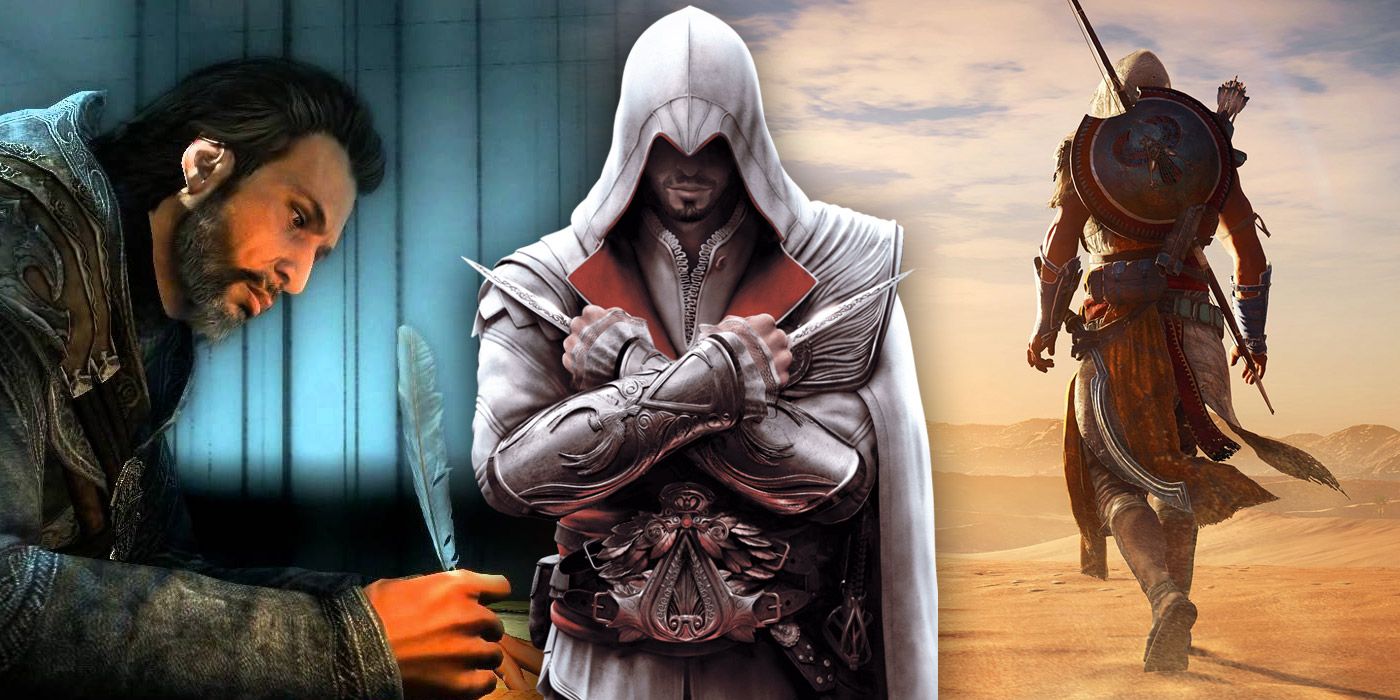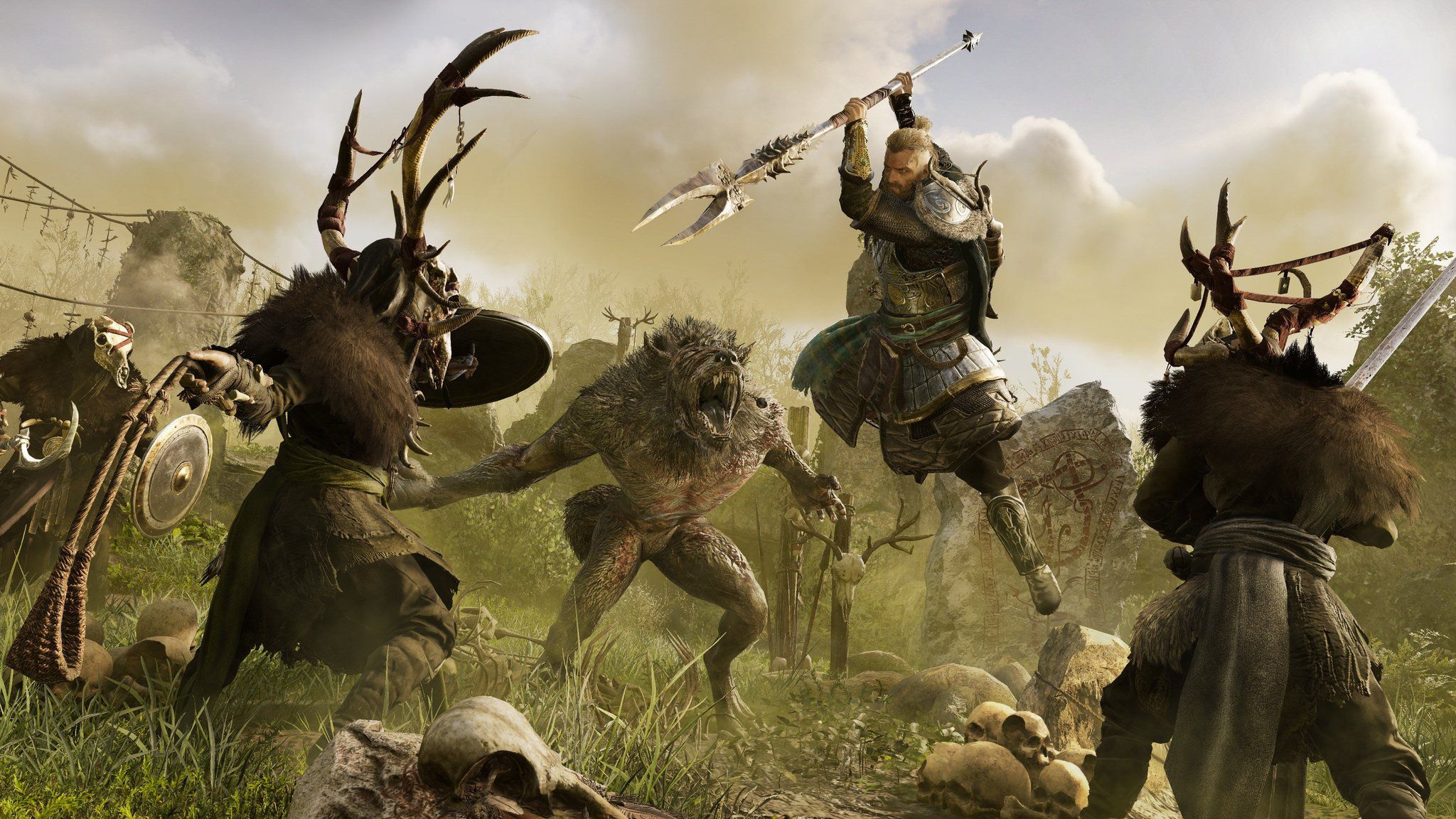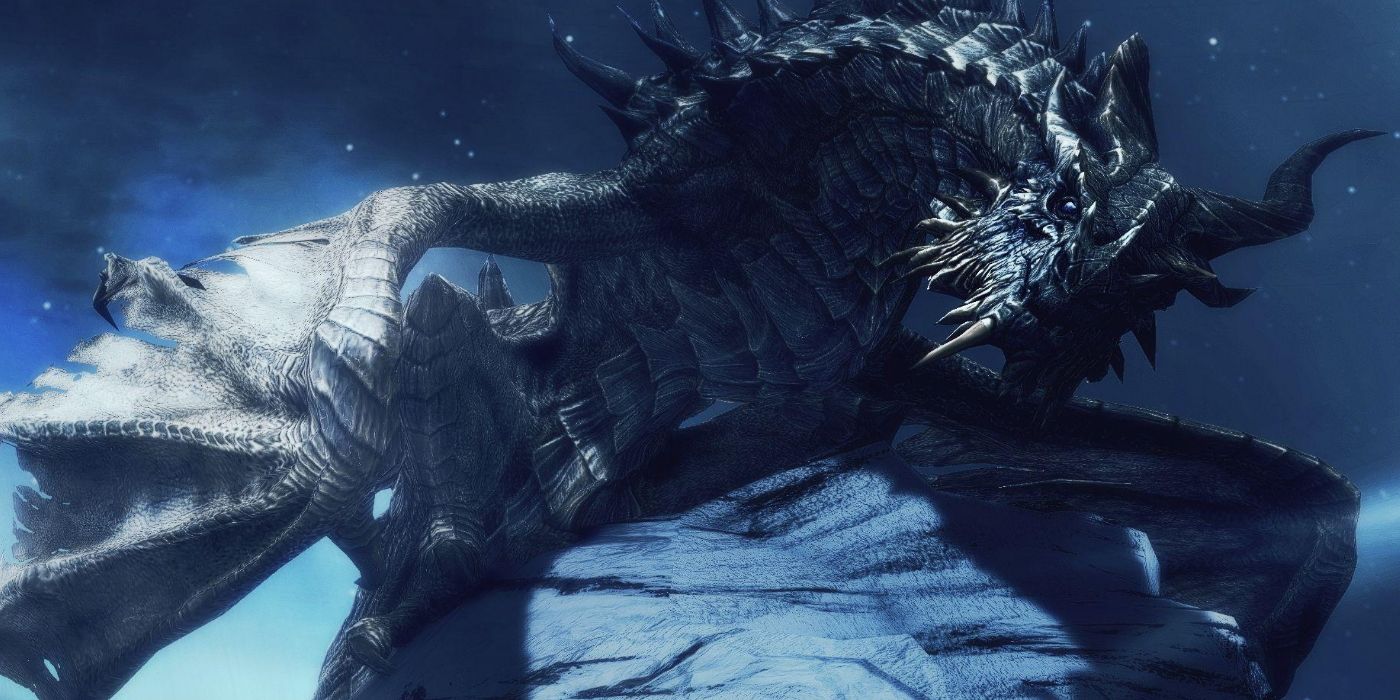Assassin's Creed Valhalla players will be able to leave England behind and find a new story and saga in Ireland next month with the Wrath of the Druids DLC. At first, much of the information that came out seemed promising. There's story details of real and interesting kings, bringing Ireland to life realistically, and more. Combine this with the a new cult, the Children of Danu, and the direction seemed really promising.
That was, until, a recent slate of AC Valhalla screenshots revealed Werewolves for the DLC. Their inclusion has sparked a lot of debate throughout the community, and it doesn't seem to be going anywhere any time soon. However, what should be noted that there's reason to believe that werewolves aren't the extent of it—there is a real chance that Assassin's Creed Valhalla will add dragons in its DLC too.
The Ongoing Assassin's Creed Debate
Before diving into werewolves, history, mythology, and of course, dragons, the debate and context around them is important to understand. In short, it seems Assassin's Creed is falling into a new rut for many fans. When a franchise is as old as Assassin's Creed, with as many games to boot, there will indubitably be periods that many question. For example, Assassin's Creed once seriously suffered from franchise fatigue. The movement away from Ezio and beyond the Kenway Saga, combined with the annualized releases of the franchise, saw many turning away from it. Combine this with how Edward Kenway wasn't really an Assassin, combine this with Assassin's Creed Unity's rocky launch, and combine this with Assassin's Creed Syndicate's own shortcomings, and the franchise needed to reinvent itself.
Taking a year off, the franchise then went in another direction. Assassin's Creed Origins introduced RPG and open-world elements to the franchise, with AC Odyssey doubling down on that and Assassin's Creed Valhalla going another direction. If there's one thing to be said about the Ancient Saga/AC RPGs, there really hasn't been much consistency in terms of approach, at least in terms of RPG elements. In doing so, social stealth, parkour, the franchise's iconic gameplay, and even the identity of the protagonist as an Assassin did not live up to it. In reinventing itself, many now argue that the franchise has an identity crisis; not only are the latest games a far cry from the original, but their own approaches are varied.
That's just mechanically: some enjoy the RPGs, while others want the return to the original action-adventure approach. But that's just one layer. Combine this with how the AC RPGs have really emphasized the Isu, bringing in more elements of mythology, and many are saying the franchise has abandoned "realism." A good point of comparison is alternate history vs. historical fiction. The latter games find themselves in the former, as it twists events to fit a wider narrative, while the "original" games fit a more straightforward story to historical events.
In truth, when it comes to debating the identity of the franchise, there's no solid answer. RPGs, action-adventure, sci-fi, realism, fantasy all find themselves in the franchise now, with ancient religions aplenty recognized as Isu, with realms like Atlantis and The Underworld existing in some simulation of sorts, with an ancient civilization that was highly scientifically advanced seen through multiple cultural lens, with Isu creating beasts like the Minotaur, and glowing apples, cloaks, staffs, swords, and more. All of this, too, being part of a franchise where cloaks, daggers, hoods, and assassinations are met with Medjay, Misthios, and Vikings. It's all there, somewhere, and what part someone loves is just that: a part of the Assassin's Creed franchise.
Now, that inherently implies an identity split, and what matters for many now is where the franchise goes next. Bringing back a legitimate Assassin character would be welcomed by many, while making stealth and social stealth more of a focus would help. Somewhere, it feels like there's an Assassin's Creed RPG where all of this and more is possible; for now, though, all eyes are on what's immediately next for Assassin's Creed Valhalla: the werewolf.
Assassin's Creed: Werewolves, Mythology, and More
First and foremost there, it's worth mentioning that a lot about the werewolf (or werewolves) is currently un-explained. There's simply a screenshot (seen above) of Eivor in combat with the Children of Danu, who are seemingly assisted by a werewolf. Now, from a mythological perspective, they "existed" in Ireland around this time. Wolf-like warriors, sometimes described with Lupine-like appearances or wearing wolf skins, are the basis of this myth, so it seems anyway. Clearly, that's not the direction here: the above werewolf is just that, a werewolf.
What this means is that, well, it has to be explained. Therein lies the problem: it seems like there is a constant stretch to justify mythological inclusions. For example, Egyptian gods were manifested by the Animus in AC Origins, the Minotaur and Medusa (and more) were explained by the Isu's Olympos Project, and the worlds of Asgard/Jotunheim were explained by a drug allowing Eivor to witness the First Catastrophe from her own cultural lens/the Norse Isu perspective. Whether it's something like drugs or a Piece of Eden, the explanations seem thin to many, included for mythology's sake alone.
However, while debating sci-fi or fantasy or any of that, it's important to remember that mythology is just as important to culture as history. And history/culture is a key part of the Assassin's Creed identity. Many may not like the way that it is being explored, but it's still a key component. The Irish myths of werewolves exist today because of how they existed historically, the myths of the Greek monsters exist because of how they existed then, and the culture of the Vikings were so warrior-oriented because of their beliefs. Exploring those only enhances that historical perspective; it doesn't necessarily matter if it's told from a sci-fi or fantasy perspective, as long as it's integrate to the culture/history.
Again, this comes with the caveat that Ubi has not explained the werewolf yet. If it's a key part of the story and it's explained without relying on something like drugs/a Piece of Eden, it could just be another aspect exploring the mythological side of history. Again, that's not going to make everyone happy, but a werewolf is not that different from Medusa, from a Frost Giant, or the like.
Dragons Are Mythological, But...
The same could be said of dragons, sure, and while many may not believe dragons are incoming, the inclusion of werewolves suggest it is indeed possible. YouTuber j0nathan, whose track record has seemingly been proven time and again, once discussed both dragons and werewolves in Assassin's Creed Valhalla. With the latter now confirmed, it stands to reason that players may see dragons in Wrath of the Druids. It lines up with Irish mythology, and if not then, there's still the curious AC Valhalla DLC 3 comet that could imply something like a dragon. Nonetheless, Wrath of the Druids makes the most sense from a mythological perspective.
Druids believed that a Dragon's power affected the land (and it's notable that Danu is a goddess associated with the Earth). Dragons were thought to influence the flow of the world's energy, with there being winged four-legged versions, gatekeepers to other worlds and worldly secrets, and a protector of the Earth and all living things. With that in mind, it's not hard to see how a dragon could be associated with Danu and serve as a boss of the DLC.
However, just because Ubi could explain a dragon in Assassin's Creed, it doesn't mean it should. It's a twist of Ian Malcom's classic Jurassic Park quote: "Your scientists [Ubisoft] were so preoccupied with whether they could, they didn't stop to think if they should." While a werewolf may just be another version of a creature like the Medusa or Minotaur, a dragon has altogether different implications. In terms of scope, a dragon would be more akin to Assassin's Creed Odyssey's Hekatoncheir. In a simulation of the Isu, with the Olympos background, the Hektoncheir was just exactly what it was: a big threat.
Yet, it doesn't seem that Ireland is a simulation. It doesn't seem drugs or lore about men in wolf skin could explain a dragon away. And, perhaps most importantly, a dragon is an iconoclast of high fantasy. When gamers think dragon, they think Skyrim. It's not that Assassin's Creed hasn't contained several mythological or fantastical elements before; it's that it hasn't contained the most iconic fantasy element. Players may be concerned about werewolves now, but it seems that may be the minor league compared to watching Eivor fight off a dragon. It could be a fun combat set piece, the same concept as the Hekatoncheir, but it could have long-lasting implications for just how far Assassin's Creed is willing to go. Dragons, perhaps, are a step too far.
Assassin's Creed Valhalla's Wrath of the Druids DLC releases May 13 for PC, PS4, PS5, Stadia, Xbox One, and Xbox Series X.




